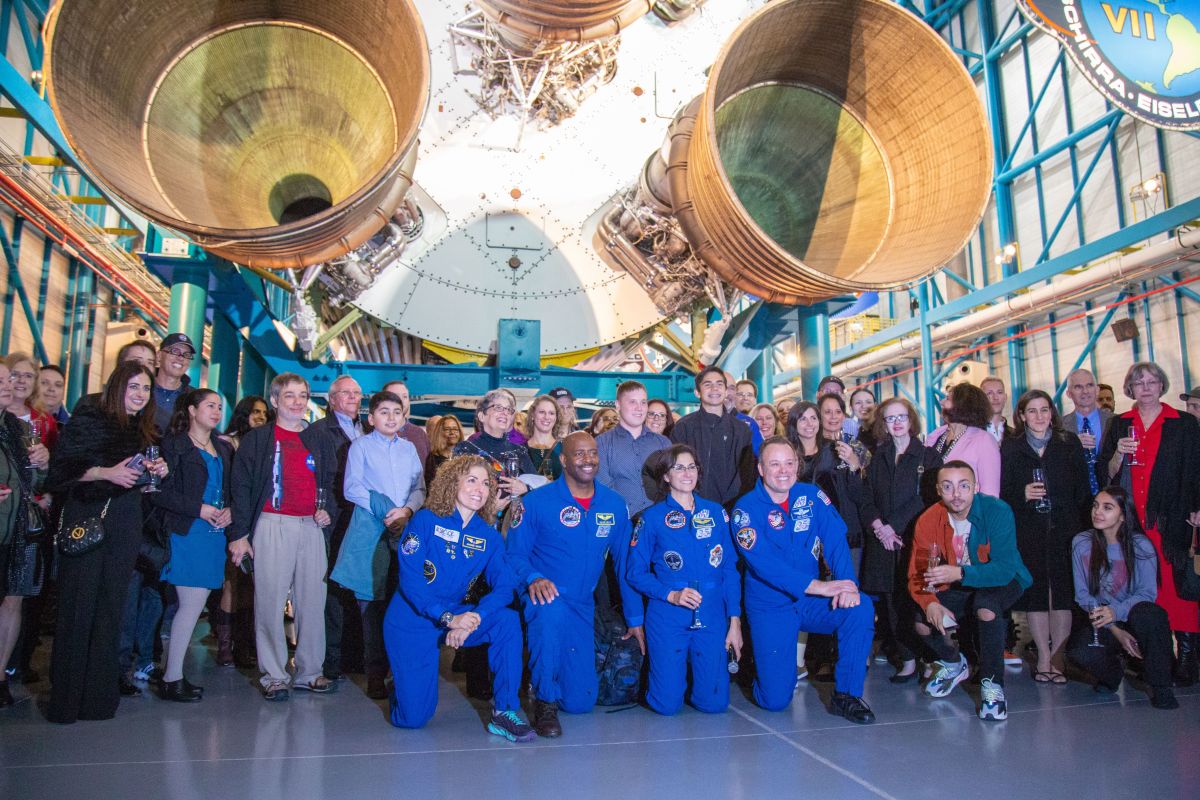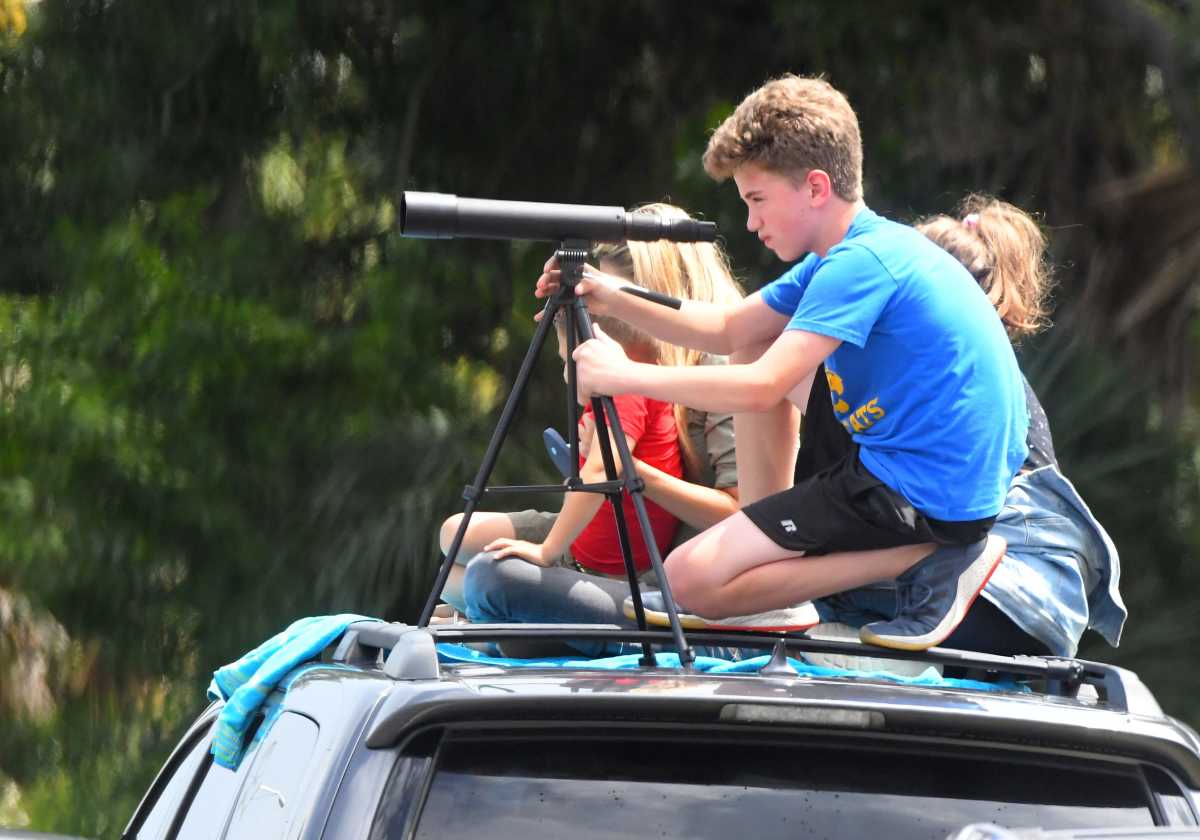For Jaguars’ Josh Dobbs, the Sky Isn’t the Limit
There were three miles between Josh Dobbs and the launch pad, enough distance to be safe. Yet as the rocket began its fiery ascent to the horizon, Dobbs and those around him—U.S. Senators, Representatives, the Vice President and President, to name a few—began to feel the rush on their viewing platform.
“It was really powerful,” Dobbs says to Jaguar Report.
Next to Dobbs was Charles Bolden. He’s seen his fair share of launches over the years, but he was still ecstatic for this one—the first launch of astronauts from American soil in nine years. And yet, he couldn’t keep himself from watching Josh.
“Having an opportunity to stand there next to Joshua and watch him, all the excitement and everything," Bolden says. "To see the awe on his face, and I cannot help but think something inside him probably said I’d love to do that one of these days."
Mission Success! Today, Americans return to space from FL’s Space Coast for 1st time in 9 yrs. What a tremendous honor to have been here. A cohesive team can accomplish anything! Congrats to @nasa, @spacex, @nasakennedy & all involved in today’s historical mission. Godspeed!🍊🚀 pic.twitter.com/AN9FE3guDj
— Josh Dobbs (@josh_dobbs1) May 30, 2020
Being part of a launch one day isn't an unobtainable dream for Dobbs. He says his Jags teammates already consider that a possibility.
“They come and ask a lot of questions,” he laughs. “They’re funny, like ‘he’s literally an astronaut.’ That’s their go-to thing.”
As valid as it is though, is it feasible? What would it actually take to transition from one demanding career to another? As Dobbs watched the SpaceX rocket barrel toward the edge of the atmosphere, and as Charles Bolden watched Dobbs, the future of American space travel rose before them. And maybe, they were watching the future of Josh Dobbs, as well.
Until now there’s been only one—Leland Melvin.

In the 62-year history of NASA, Melvin is the only person to have played in the NFL before becoming an astronaut. His Detroit Lions jersey hangs in the Pro Football Hall of Fame, a spot of honor after it returned from space. Melvin bounced around to three teams his rookie season before a hamstring injury ended the pro path for the University of Richmond wide receiver. He turned his attention to aeronautical engineering and in 2008, flew his first mission on the Space Shuttle Atlantis. Bolden—a former high school quarterback himself—describes Melvin as “my first hero.”
Now the two are joining forces and turning their attention to Dobbs.
Bolden holds several titles: Major General in the United States Marine Corps, a four-time veteran of Space Shuttle missions and the 12th Administrator of NASA. He graduated from the U.S. Naval Academy and has flown 100-plus wartime missions. He’s been to space and overseen the transition at NASA from the Space Shuttle program to the International Space Station era. He served in the Obama Administration, founded The Bolden Group consulting firm and now acts as an American science envoy worldwide. Yet several weeks ago, when old acquaintances at the Kennedy Space Center sent him an article from a local paper, he read it in awe.
The young man in the article was Dobbs and the story enraptured Bolden. He immediately reached out, wanting to speak with the guy who was simultaneously pursuing two demanding careers. A few short weeks later, the two found themselves at the Kennedy Space Center. It was Bolden who stood in admiration of the person in front of him.
“I was sort of like a gaga fan to be honest, "Bolden says. "Meeting Josh was really a treat for me personally.”
Dobbs is entering his fourth year in the NFL, his second with the Jaguars, and he holds a degree from the University of Tennessee in aerospace engineering. So yes, he’s a rocket scientist. During an NFL Players Association externship this spring—before the breakout of COVID-19—Dobbs spent three weeks at the Kennedy Space Center, arranged by former Tennessee Volunteer graduates, floating to see the inner workings of each team that come together to launch rockets from the United States.
“To be down there, take it all in," Dobbs says, "it really kinda brought everything home for my experience down there, understanding what NASA’s doing. How they’re partnering with these commercial companies and then to be there for the first commercial launch and the first launch on U.S. soil since 2011, it was an encapsulating experience."
The lessons there are applicable on the field as well. Dobbs says his engineering skills are transferrable to playing quarterback.
“When you go to school for engineering, from the second you step on campus, you’re given a physics problem," Dobbs says. "You’re asked to find the most efficient way to solve that problem and then repeat it for the next one.
“When you’re a quarterback on the football field, the defense is constantly presenting problems, and you’re tasked with, ‘OK, let me efficiently solve this problem and move to the next one.’ So having that constant critical-thinking mindset, that engineering mindset, that problem-solving mindset, is exactly how it correlates. So you’re practicing on both, whether you’re in the engineering world or you’re on the field.”
Dropped back, intent on passing the ball, looked rt then can back left and saw you locked in with that slight grin on your face. I said, oh no, not today #51, not today!😂😂🚀 https://t.co/CfJFcu7Gml
— Josh Dobbs (@josh_dobbs1) June 27, 2020
It's his natural intelligence and dedication to stretching his mind that has helped Dobbs memorize the numerical value of Pi beyond the 80th decimal and become a flexible field engineer, which Bolden sees translating directly to a future with NASA.
“You’re constantly pursuing the field and trying to think of something that the defense does not expect you to do," Bolden says. "He’s constantly surveying the field.
"In the space program—although we have a really good plan in place—we’re constantly looking for input from people who may say, ‘You know, I know this is what we said we’re going to do, but there’s really a better idea out there.’”
Amid the coronavirus pandemic and the amplified cultural revolutions, pockets of the population that seem to have answers can become a safe place, a tether for a drifting society. Often times, sports provide that common ground.
But, sports are still in limbo. It’s why for a least a window of time on the last Saturday afternoon in May, eyes countrywide turned to the launch pad in Cape Canaveral, Fla., and found a common rooting interest.

It was also a reminder for both Dobbs and Bolden that aside from all the practical applications, the camaraderie and spirit provided in both sports and the space program are similar.
“Space is not terribly unlike football,” Bolden says. “In football you have a single mission, that’s to win and to defeat the other team. In spite of all the differences—be it racial, sexual persuasion, or whatever else, everybody’s focused on the game plan and finding a way to defeat the other team.
"In space, you’re not trying to defeat anybody but you do have a mission. You’re trying to come together and you actually want as much diversity on your team as you can in the space world. We’re always looking for somebody who has an oddball idea, something that we haven’t tried before that may in fact bring us success.”
Adds Dobbs, “It truly shows what as—whether it’s as a nation or just the human race—when we combine our minds, combine our diversity, combine our different backgrounds, combine our different ways of thinking, combine our different experiences, it really shows what that cumulation of thoughts can do. The feat of launching something out of the Earth’s atmosphere is not easy and then to strap astronauts aboard that as well, adds a different level of risk to that.
“That was a pretty, a pretty tough weekend going on in the United States while I was down there. So to have that launch... that was the perfect example of what unity looks like. It’s literally engineers, various moving parts, companies, various people across the country that don’t even interact with each other on a daily basis, but they’re all working together toward a common goal.
“If we all come together, we can accomplish anything, from solving social issues and reform to launching a rocket to the International Space Station.”
There could come a day when Dobbs is part of the latter. He and the Jaguars have all made increased efforts to address the former in recent weeks. For now, he’ll continue to spend his offseason preparing for the upcoming season.
He spent time working with starter Gardner Minshew II before a spike in COVID-19 cases led to the NFLPA asking players to no longer work out together in person. When things begin to reopen, he hopes to take teammates to the Kennedy Space Center. It’s just over two hours from TIAA Bank Field to the base. Then, it’s back to football, where Dobbs will provide depth behind Minshew in Jay Gruden’s new offense. But that’s nowhere near the end of his journey.
Author Paul Brandt once said, “Don’t tell me the sky is the limit when there are footprints on the moon.”
Granted, it has been nearly 50 years since NASA and the United States have put a man on the moon—Gene Cernan was the last to walk the surface in 1972. But the marketplace of ideas that Bolden mentioned and the excitement he saw on Dobbs' face are the sparks that can light a fire. Or a rocket ignitor.
“He’s already well on his way,” Bolden says.
Dobbs already has the undergraduate technical degree and experience working at the Kennedy Space Center. Bolden says Dobbs would need to get a master's degree, which he expects Dobbs to have no issue getting.
“According to everything I’ve seen," Bolden says, "he was a really good student. And if you can be a good student while you’re playing Division-I college football, then you’re a really good student."
Bolden knows the lifespan of an NFL playing career is relatively short. If Dobbs isn't interested in flying missions to space, Bolden says there are plenty of aerospace careers awaiting Dobbs once his playing days are over.
And if Dobbs has cold feet, Bolden can always turn to Melvin, Dobbs' "first hero," to convince the Jags quarterback.
“Leland and I decided we were gonna gang up on Josh," Bolden says, "To convince him that he should enjoy his NFL career, but keep his toes in the water for becoming an astronaut one of these days.”
One of these days might seem far away. But it’s well within reach. Dobbs admits it's an enticing opportunity that could carry on long after football is over.
“Getting a chance to work with NASA—and that was my first time getting experience in the space realm, to see what NASA does and kind of see what the life of an aerospace engineer is—I had been, had a couple of internships on the aviation side, to be able to get the other side of it, I think it showed me there’s a lot of possibilities.
“It would be amazing to work for NASA, so I think space is definitely a possibility.”
